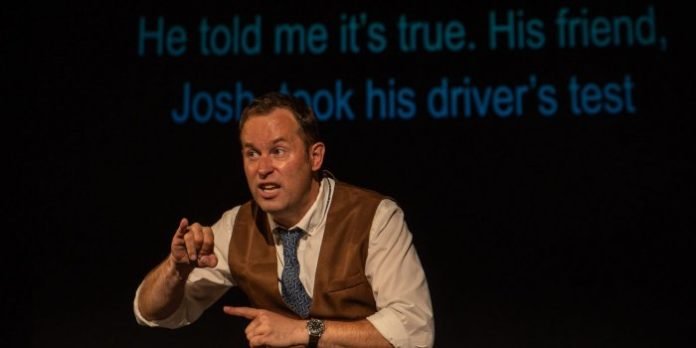Vancouver’s Pi Theatre presents Chris Dodd’s new solo show, Deafy, which combines ASL, surtitles, and spoken word to weave together a tragicomedy that takes the audience on an unexpected journey of discovering what it really means to belong.
There is still much misconception and misunderstanding about those who are Deaf, and I feel the show is a perfect vehicle for addressing those and shining a light on the particular challenges we face daily, as told by Nathan’s stories.
We learn more about Deafy in this Q&A with Dodd.
Deafy plays as part of Pi Theatre’s Provocateurs Series at the VIFF Studio Theatre (1181 Seymour St, Vancouver) from November 24-26. Visit pitheatre.com for tickets and information.
This interview has been edited.
Tell us about Deafy. What can audiences expect?
Deafy is a solo show that I wrote and which I perform in. The play revolves around its central character, Nathan Jesper, a Deaf public speaker who travels from city to city, lecturing on deafness. However, he arrived at his venue desperately late on this particular day. As he launches his speech, he soon realizes things are not what they seem. The play is a comedy but can also be serious and thought-provoking.
What was the inspiration for the play?
I previously co-wrote another solo show, Silent Words, with my hearing director, Ashley Wright. During the later runs of the show, we added surtitles to ensure the audience could understand me. I always knew I needed to write a second show, one that went even further with discussing the specific issues that challenge Deaf people, as well as making use of surtitles in a unique and fun way. Deafy gets down to the core experience of what it is like to be Deaf, as told through the hilarious and heartfelt stories of the show’s Deaf protagonist, Nathan Jesper.
I started writing it in 2017 with the support of Canadian playwright Vern Thiessen, and it had its first showing at the SummerWorks Performance Festival in Toronto in 2019. After a pause for COVID, the show started touring, and we’ve had a chance to really refine it and fine-tune it. It was published last year by Playwright’s Canada Press under the anthology Interdependent Magic.
Why Deafy as the title for the show?
“Deafy” is a tongue-in-cheek way that Deaf people describe each other, much in the same way we would use the term “Canuck” to describe Canadians. The title contains some irony, as audiences will discover.
Why this particular show now?
Deafy is a very personal show. The central character, Nathan, is not me, yet he encapsulates many particular similar moments from my own life and the lives of Deaf friends.
There is still much misconception and misunderstanding about those who are Deaf, and I feel the show is a perfect vehicle for addressing those and shining a light on the particular challenges we face daily, as told by Nathan’s stories.
Deaf actors are having a spotlight moment right now, especially in film and television. We need to be able to tell our own stories in our own language instead of having our stories told by others.
What do you hope audiences leave Deafy talking about?
Deafy deals with community, acceptance and the nature of belonging. Many people have spoken with me about their reflections on their communities and struggles to fit in. Even though the show focuses on deafness, there are universal themes with which all audiences will be able to identify. The journey Nathan takes the audience on is also unusual, and there is much to ponder once the play is over.
Why should someone come to see Deafy?
It’s fun, hilarious and is guaranteed to make you think. Also, It is presented in ASL, spoken English and surtitles, so it is accessible to everyone, Deaf and hearing alike.

